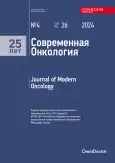Immunological predictors of the therapeutic efficacy of atezolizumab in combination with nab-paclitaxel in metastatic triple-negative breast cancer: A pilot multicenter retrospective associative study
- Authors: Kalinchuk A.Y.1, Popova N.O.1, Gofman A.A.2, Usoltseva I.S.3,4, Perelmuter V.M.1, Tashireva L.A.1
-
Affiliations:
- Tomsk National Research Medical Center of the Russian Academy of Sciences
- Altai Regional Oncologic Dispensary
- Sakhalin Regional Oncologic Dispensary
- Pacific State Medical University
- Issue: Vol 26, No 4 (2024)
- Pages: 414-419
- Section: Articles
- URL: https://journals.rcsi.science/1815-1434/article/view/280720
- DOI: https://doi.org/10.26442/18151434.2024.4.202713
- ID: 280720
Cite item
Full Text
Abstract
Background. Chemoimmunotherapy with the combination of atezolizumab and nab-paclitaxel demonstrates clinical benefit at 12 months in only 45.8% of patients with metastatic triple-negative PD-L1-expressing breast cancer. This emphasizes the relevance of finding predictor markers of high sensitivity to immunotherapy. Since atezolizumab acts through the local immune system, assessing its status prior to therapy administration may be crucial.
Aim. The objective of this study was to evaluate the predictor significance of immunological parameters of tumour microenvironment in patients with metastatic triple-negative cancer receiving therapy with atezolizumab in combination with nab-paclitaxel.
Materials and methods. Eleven patients with metastatic triple-negative breast cancer, who received atezolizumab in combination with nab-paclitaxel, were included in the study. Among them, five patients exhibited a durable response (progression-free survival >6 months), while six patients had a short response (progression-free survival ≤6 months). Tumour microenvironment parameters (the proportion of immune cells in the microenvironment and their expression of PD-L1 and PD-1) were analyzed by TSA-associated multiplex immunofluorescence (Tyramide Signal Amplification) using the Vectra® 3.0 tissue analysis system and InForm® software (Akoya Bio, USA).
Results. The study revealed that CD163+-macrophage counts below 6.475% of all tumor stromal cells were associated with long-term efficacy of atezolizumab in combination with nab-paclitaxel in patients with metastatic triple-negative cancer.
Conclusion. The number of CD163+-macrophages in the tumor stroma could potentially serve as a marker for predicting the efficacy of atezolizumab in combination with nab-paclitaxel in patients with metastatic triple-negative cancer.
Keywords
Full Text
##article.viewOnOriginalSite##About the authors
Anna Yu. Kalinchuk
Tomsk National Research Medical Center of the Russian Academy of Sciences
Author for correspondence.
Email: annakalinchuk2022@gmail.com
ORCID iD: 0000-0003-2106-3513
SPIN-code: 3763-0291
Res. Assist., Cancer Research Institute
Russian Federation, TomskNataliya O. Popova
Tomsk National Research Medical Center of the Russian Academy of Sciences
Email: annakalinchuk2022@gmail.com
ORCID iD: 0000-0001-5294-778X
SPIN-code: 7672-1029
Cand. Sci. (Med.), Cancer Research Institute
Russian Federation, TomskAlina A. Gofman
Altai Regional Oncologic Dispensary
Email: annakalinchuk2022@gmail.com
SPIN-code: 2115-7522
Department Head, Altai Regional Oncologic Dispensary
Russian Federation, BarnaulInessa S. Usoltseva
Sakhalin Regional Oncologic Dispensary; Pacific State Medical University
Email: annakalinchuk2022@gmail.com
acting Department Head, Аssistant
Russian Federation, Uhzno-Sakhalinsk; VladivostokVladimir M. Perelmuter
Tomsk National Research Medical Center of the Russian Academy of Sciences
Email: annakalinchuk2022@gmail.com
ORCID iD: 0000-0002-7633-9620
SPIN-code: 6252-5319
D. Sci. (Med.), Prof., Cancer Research Institute
Russian Federation, TomskLiubov A. Tashireva
Tomsk National Research Medical Center of the Russian Academy of Sciences
Email: annakalinchuk2022@gmail.com
ORCID iD: 0000-0003-2061-8417
SPIN-code: 4371-5340
D. Sci. (Med.), Cancer Research Institute
Russian Federation, TomskReferences
- Schmid P, Adams S, Rugo HS, et al.; IMpassion130 Trial Investigators. Atezolizumab and Nab-Paclitaxel in Advanced Triple-Negative Breast Cancer. N Engl J Med. 2018;379(22):2108-21. doi: 10.1056/NEJMoa1809615
- Fabi A, Carbognin L, Botticelli A, et al. Real-world ANASTASE study of atezolizumab+nab-paclitaxel as first-line treatment of PD-L1-positive metastatic triple-negative breast cancer. NPJ Breast Cancer. 2023;9(1):73. doi: 10.1038/s41523-023-00579-2. Erratum in: NPJ Breast Cancer. 2023;9(1):89. doi: 10.1038/s41523-023-00596-1. Erratum in: NPJ Breast Cancer. 2024;10(1):13. doi: 10.1038/s41523-024-00619-5
- Tashireva LA, Muravyova DT, Popova NO, et al. Parameters of Tumor Microenvironment Determine Effectiveness of Anti-PD-1/PD-L1 Therapy. Biochemistry (Mosc). 2021;86(11):1461-8. doi: 10.1134/S0006297921110092
- Mao Y, Qu Q, Chen X, et al. The prognostic value of tumor-infiltrating lymphocytes in breast cancer: a systematic review and meta-analysis. PLoS One. 2016;11(4):e0152500. doi: 10.1371/journal.pone.0152500
- Li JJ, Tsang JY, Tse GM. Tumor Microenvironment in Breast Cancer-Updates on Therapeutic Implications and Pathologic Assessment. Cancers (Basel). 2021;13(16):4233. doi: 10.3390/cancers13164233
- Adams S, Diamond JR, Hamilton E, et al. Atezolizumab Plus nab-Paclitaxel in the Treatment of Metastatic Triple-Negative Breast Cancer With 2-Year Survival Follow-up: A Phase 1b Clinical Trial. JAMA Oncol. 2019;5(3):334-42. doi: 10.1001/jamaoncol.2018.5152
- Tashireva LA, Kalinchuk AY, Gerashchenko TS, et al. Spatial Profile of Tumor Microenvironment in PD-L1-Negative and PD-L1-Positive Triple-Negative Breast Cancer. Int J Mol Sci. 2023;24(2):1433. doi: 10.3390/ijms24021433
- Larroquette M, Guegan JP, Besse B, et al. Spatial transcriptomics of macrophage infiltration in non-small cell lung cancer reveals determinants of sensitivity and resistance to anti-PD1/PD-L1 antibodies. J Immunother Cancer. 2022;10(5):e003890. doi: 10.1136/jitc-2021-003890
- Li W, Wu F, Zhao S, et al. Correlation between PD-1/PD-L1 expression and polarization in tumor-associated macrophages: A key player in tumor immunotherapy. Cytokine Growth Factor Rev. 2022;67:49-57. doi: 10.1016/j.cytogfr.2022.07.004
- Xiong H, Mittman S, Rodriguez R, et al. Anti-PD-L1 Treatment Results in Functional Remodeling of the Macrophage Compartment. Cancer Res. 2019;79(7):1493-506. doi: 10.1158/0008-5472.CAN-18-3208
- Ramesh A, Brouillard A, Kumar S, et al. Dual inhibition of CSF1R and MAPK pathways using supramolecular nanoparticles enhances macrophage immunotherapy. Biomaterials. 2020;227:119559. doi: 10.1016/j.biomaterials.2019.119559
- Wang C, Chen Q, Chen M, et al. Interaction of glioma-associated microglia/macrophages and anti-PD1 immunotherapy. Cancer Immunol Immunother. 2023;72(6):1685-98. doi: 10.1007/s00262-022-03358-3
- Zitvogel L, Apetoh L, Ghiringhelli F, Kroemer G. Immunological aspects of cancer chemotherapy. Nat Rev Immunol. 2008;8(1):59-73. doi: 10.1038/nri2216
Supplementary files












